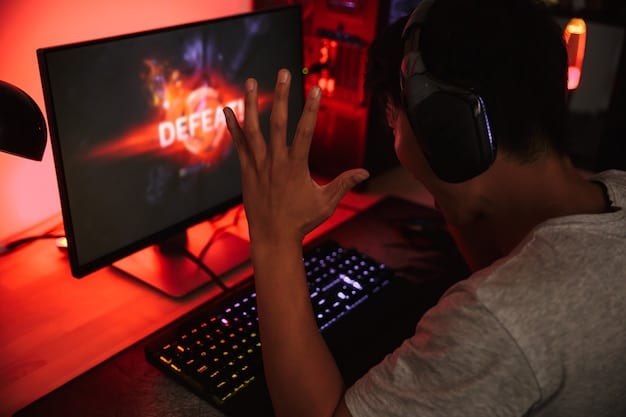Don’t Get Banned: Updated Anti-Cheat Policies in PC Games

Understanding and avoiding anti-cheat systems in PC games is crucial for maintaining a positive gaming experience; updated policies aim to create a fair environment, but unfamiliarity can lead to unintentional violations and potential bans.
Navigating the world of PC gaming involves more than just skill; understanding the updated anti-cheat policies is crucial to enjoying your favorite titles without the frustration of being banned. Let’s dive into how to keep your gaming clean and compliant.
Understanding the Basics of Anti-Cheat Systems
Anti-cheat systems have become a fundamental part of modern PC gaming. These systems are designed to ensure a fair and balanced gameplay environment by preventing players from using unauthorized software or techniques to gain an unfair advantage. Understanding how these systems work is the first step in avoiding unintentional violations.
The goal of anti-cheat measures is to detect and prevent cheating, which can range from using aimbots and wallhacks to exploiting game glitches and modifying game files. These practices can ruin the experience for other players and undermine the integrity of the game. Let’s explore the common types of anti-cheat systems.
Common Types of Anti-Cheat Software
Many anti-cheat systems operate in real-time, monitoring game processes and system behavior to identify suspicious activities. These systems often use a combination of techniques to detect cheating:
- Signature Scanning: This involves identifying known cheat programs by their unique signatures. When the anti-cheat software detects a matching signature, it flags the user.
- Behavioral Analysis: This technique analyzes player behavior, looking for patterns that deviate significantly from normal gameplay, such as impossible reaction times or inhuman accuracy.
- File Integrity Checks: Anti-cheat systems regularly check game files to ensure they haven’t been modified, as modified files can indicate the use of cheats or hacks.

Staying informed about these basic functions can help gamers understand the boundaries and avoid unintentional violations. Regularly updating your game client and avoiding suspicious third-party software are good starting points.
Why Anti-Cheat Policies Are Constantly Evolving
The battle against cheating in PC games is an ongoing arms race. As developers create new anti-cheat measures, cheaters develop new methods to bypass them. This constant back-and-forth necessitates continuous updates and improvements to anti-cheat policies. This is why understanding the need for evolution is critical to respecting the rules.
The stakes are high for game developers, as a reputation for being plagued by cheaters can drive players away and damage the game’s community. This is why developers invest considerable resources in anti-cheat technologies and are often quick to adapt to new threats. Here are some reasons why these policies must evolve:
- New Cheat Development: As new games come out so do new cheats. Developers must actively change up and adapt their methods to counteract the new work arounds.
- Technological Advancement: As technology advances, so do the methods to exploit games and avoid detection. Anti-cheat systems must stay up to par with changes.
- Community Feedback: Player reports and community feedback play an important role in identifying new cheating methods and areas where anti-cheat measures need improvement.
The evolution of anti-cheat policies is a sign of a healthy and vigilant game development environment. By staying informed and adapting to these changes, players can contribute to a fairer and more enjoyable gaming experience for everyone.
Common Misconceptions That Lead to Bans
Despite the best intentions, many players find themselves banned due to common misconceptions about what constitutes cheating. Understanding these misconceptions is crucial for staying on the right side of the rules, such as what you should and shouldn’t trust.
Many bans are avoidable if players are aware of the specific rules and guidelines set by game developers. Here are some common misconceptions that can lead to unintentional violations and subsequent bans. Let’s dive in.
Using Third-Party Software
Many players assume that all third-party software is acceptable, but this is not the case. Programs that interact with the game client, provide an unfair advantage, or modify game files are typically prohibited.
Exploiting Glitches
Intentionally exploiting game glitches to gain an advantage, such as clipping through walls or duplicating items, is often considered a form of cheating and can lead to a ban.
Account Sharing
Sharing your account with others, even friends or family members, may violate the game’s terms of service. This is because it can be difficult to track who is responsible for any cheating activities that occur on the account.

By understanding these common misconceptions, players can avoid unintentional violations and maintain a positive reputation within the gaming community. Always refer to the game’s official guidelines and terms of service to stay informed about specific rules and restrictions.
How to Stay Updated on Policy Changes
Staying current with anti-cheat policy changes is essential for maintaining a clean gaming record. Game developers often announce updates through various channels, and it’s up to players to stay informed. These changes can be small alterations or big system implemented reworks, so checking back every so often will serve you well.
Keeping up with these updates can prevent unintentional violations and ensure you’re always playing within the rules. Here are some ways to stay in the loop.
- Official Game Forums: Most games have official forums where developers post announcements, patch notes, and policy updates. Check these forums regularly to stay informed.
- Social Media: Follow the game’s official social media accounts on platforms like Twitter, Facebook, and Reddit, as these are often used to share news and updates.
- Community Discussions: Participate in community discussions on platforms like Discord, Reddit, and forums to learn about policy changes and share information with other players.
Staying informed is easy if you take a little time to research the best information streams. These strategies help ensure you’re always playing by the latest rules and guidelines, contributing to a fair gaming environment.
The Consequences of Violating Anti-Cheat Policies
Violating anti-cheat policies can lead to severe consequences, ranging from temporary suspensions to permanent bans. These penalties are designed to deter cheating and maintain the integrity of the gaming environment. It’s important to know the potential penalties.
Understanding the potential repercussions can motivate players to adhere to the rules and guidelines set by game developers. Here’s an overview of what can happen if you’re caught cheating or violating anti-cheat policies:
Temporary Suspensions
In some cases, first-time offenders may receive a temporary suspension from the game. This can last from a few days to several weeks, depending on the severity of the violation.
Permanent Bans
More serious violations, such as using advanced cheats or repeatedly violating the rules, can result in a permanent ban from the game. This means you will no longer be able to access your account or play the game.
Account Reset or Loss of Progress
In addition to bans, some games may reset your account, wiping out your progress and achievements. This can be a significant setback for players who have invested a lot of time in the game.
The consequences of violating anti-cheat policies serve as a strong deterrent against cheating. By understanding the potential penalties, players can make informed decisions and avoid actions that could jeopardize their gaming privileges.
Appealing a Ban: What You Need to Know
If you believe you’ve been unfairly banned from a game, it’s important to know how to appeal the ban. The appeals process varies from game to game, but there are some general steps you can take to increase your chances of having the ban overturned. Not every appeal will render a change but it’s always worth a try.
Knowing how to navigate the appeals process can provide recourse for players who believe they’ve been wrongly accused. Here’s a breakdown of what you need to know.
- Review the Evidence: Before submitting an appeal, carefully review the evidence provided by the game developer. Understand the reason for the ban and gather any evidence that supports your case.
- Submit a Formal Appeal: Follow the game’s official appeals process, which may involve submitting a ticket through the support website or contacting the developers directly. Provide a clear and concise explanation of why you believe the ban was unjustified.
- Provide Supporting Documentation: Include any relevant documentation, such as screenshots, videos, or witness statements, that support your case. The more evidence you can provide, the stronger your appeal will be.
Going through the appeals process, while not always successful, will at least lead to further investigation. Understanding your ability to appeal is important in these cases.
| Key Point | Brief Description |
|---|---|
| 🛡️ Anti-Cheat Basics | Systems prevent unfair advantages via signature scanning and behavioral analysis. |
| 🔄 Policy Evolution | Policies evolve due to new cheats and technological advancements. |
| 🚫 Common Misconceptions | Using third-party software or exploiting glitches can lead to bans. |
| ❗ Ban Appeals | You can appeal if wrongly banned, provide evidence and follow the official process. |
FAQ
▼
Common techniques include signature scanning, behavioral analysis, and file integrity checks. Signature scanning identifies known cheat programs, while behavioral analysis looks for unusual gameplay patterns. File integrity checks ensure game files haven’t been altered.
▼
Anti-cheat policies evolve to combat new cheats, adapt to technological advancements, respond to community feedback, and address emerging vulnerabilities. Constant updates are necessary to maintain a fair gaming environment.
▼
Software that interacts with the game client, provides an unfair advantage, or modifies game files is typically prohibited. Check the game’s terms of service for a list of explicitly banned programs.
▼
Consequences range from temporary suspensions to permanent bans, depending on the severity and frequency of the violation. Some games may also reset your account or wipe out your progress.
▼
Review the evidence, submit a formal appeal through the game’s official support channels, and provide supporting documentation. A clear explanation and any relevant screenshots or videos can strengthen your case.
Conclusion
Staying ahead of the curve regarding anti-cheat policies in PC games is crucial for every player who values fair play and community respect. By understanding the basics, keeping informed about policy changes, and steering clear of common misconceptions, you can ensure a smooth and enjoyable gaming experience while avoiding the dreaded ban hammer.